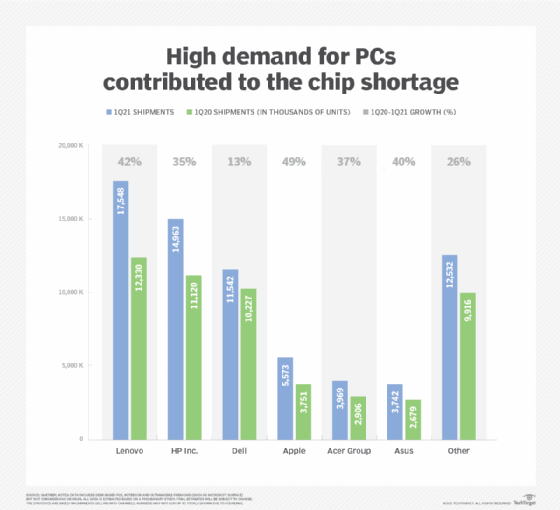
CenturionStudio.it - Fotolia
Chip shortage driving up PC prices, wait times
Businesses pay more for PCs and find it difficult to replace aging ones as the ongoing chip shortage leaves computer makers scrambling for components.
The global chip shortage that could last through 2022 has driven up prices and wait times for PCs.
The growing demand for personal computers during the pandemic and closure of chip factories globally to stop the spread of COVID-19 have contributed to the shortage. According to Gartner, wait times for PCs have risen to as many as four months, while shipments in the first quarter of 2021 grew 32% year over year.
Gartner expects the chip shortage to last at least through 2021, while research firm Canalys predicts it will continue through 2022.
"It doesn't look like any positive news right now," Gartner analyst Mikako Kitagawa said.
According to IDC, component shortages and logistics issues have contributed to higher average selling prices for PCs. HP is one of the manufacturers that have raised prices.
"Recent challenges impacting the IT industry, such as rising tariffs, freight, packaging and component costs, have resulted in a price increase for a variety of our PC products," the company said in a statement.
For Keesjan Engelen, CEO of electronics design and manufacturing company Titoma, the chip shortage forced the company to delay computer upgrades.
"Like every other business waiting for the supply to catch up, we have no choice but to keep using the PCs available to us," Engelen said.
The lack of chips slowed his company's turnaround time for electronic designs that needed silicon as well. But Engelen said Titoma's customers have understood, knowing it had "no control over the situation."
PC manufacturers have struggled to keep up with demand due to a limited supply of chips. Acer said it is talking with suppliers daily as it "strives to fulfill the backlog of demand." HP said it is "continuing to navigate through industrywide component challenges" and that the company is "working hard to meet increased demand."

Apple, which is known for its procurement power, has delayed some MacBooks and iPads due to the shortage of chips and display components, Nikkei Asia reported. However, according to Bloomberg, Apple will roll out new iPads this month, despite the constraints on critical components.
Analysts expect PC manufacturers to prioritize selling premium products instead of low and midrange computers that bring less money.
"Manufacturers will shift to higher-end equipment, as far as technically feasible, to protect margins," said Holger Mueller, an analyst at Constellation Research.
The impact of the chip shortage is worse in the automotive industry, which competes with PC and smartphone makers for semiconductors. The Wall Street Journal reported that automakers have halted production for many models because of the lack of silicon.
The fallout from the chip shortage has not gone unnoticed by the Biden administration.
On Monday, President Joe Biden met with representatives from 20 companies to discuss the shortage and promote his infrastructure bill, which would invest $50 billion in U.S. chipmakers.
This year, Biden signed an executive order that called for more government involvement in preventing supply chain disruptions.
Maxim Tamarov is a news writer covering mobile and end-user computing. He previously wrote for The Daily News in Jacksonville, N.C., and the Sun Transcript in Winthrop, Mass. He graduated from Northeastern University with a degree in journalism. He can be found on Twitter at @MaximTamarov.






